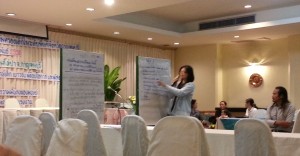Child protection conference in Kanchanaburi
March 8, 2013
HURFOM: On February 8, the Labor Rights Promotion Network (LPN) held a conference in Kanchanaburi to discuss collaborative approaches to child protection in Thailand. Participants included members of law enforcement, teachers, hospital staff, and representatives of non-governmental organizations (NGOs), and particular emphasis was placed on seven central and western provinces, like Kanchanburi and Samut Sakhon, where labor migration, human trafficking, and child labor are common. LPN, a Thai NGO, closed the conference by exploring the root causes of risks facing children today and developing ways to improve child protection.
 Members of the child rights community from Sangkhlaburi, a town in Kanchanaburi Province near the Thai-Burmese border, shared opinions about unique challenges due to their location along the migrant corridor. Conference attendees said parents may leave their children in Sangkhlaburi to find work in Thailand’s industrial sectors, and the decreased supervision contributes to incidents of drug use and higher school dropout rates. Practitioners said that some members of the Thai community do not feel responsible for migrant children because they are not considered “Thai,” and therefore the adults may not intervene on behalf of local youth even in cases of neglect or abuse.
Members of the child rights community from Sangkhlaburi, a town in Kanchanaburi Province near the Thai-Burmese border, shared opinions about unique challenges due to their location along the migrant corridor. Conference attendees said parents may leave their children in Sangkhlaburi to find work in Thailand’s industrial sectors, and the decreased supervision contributes to incidents of drug use and higher school dropout rates. Practitioners said that some members of the Thai community do not feel responsible for migrant children because they are not considered “Thai,” and therefore the adults may not intervene on behalf of local youth even in cases of neglect or abuse.
In addition, non-Thai children and families often face corruption or intimidation when applying for official Thai identification (ID) cards, despite being born in the country or having long-term residency.
“You can get a Thai ID card quickly if you have money. If you don’t have money, you need to wait and to be patient because you live in their country,” said one Thai teacher.
Another attendee added, “Some students have the 10-year card that allows them to work, but they can’t continue [their education] to the university level.”
The border region is a hotspot for child trafficking, where children may be sold into factory work or prostitution for 30,000 to 40,000 baht each. Conference discussions also identified teen pregnancy, child labor such as roadside flower sales, and an overall waning interest in school as challenges to children in the community. Some attendees said computer game shops allow children to stay late, until 3 or 4am, and should be more responsible for the young people’s wellbeing. One police officer complained that these shops were hard to target because they often look closed from the outside but are serving children throughout the night.
“It is very difficult to work for children in Sangkhlaburi because [it is a diverse] community with different cultures and languages. But one good thing is that despite these differences, they can live together,” said one local teacher. “We need training to raise awareness among parents and the community related to child protection. The community is very important for the children.”
According to one participant who works on child issues, “This conference was very useful for me because [the organizers] discussed protection measures outside of the education system as well as inside. This was a good opportunity to understand the issues in Sangkhlaburi and learn about the opinions of Thai people like teachers, police, journalists, and others.”
Comments
Got something to say?
You must be logged in to post a comment.



















































